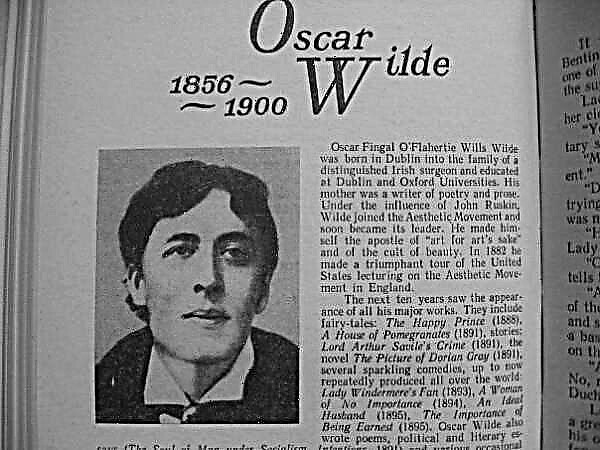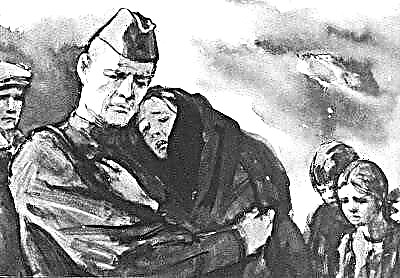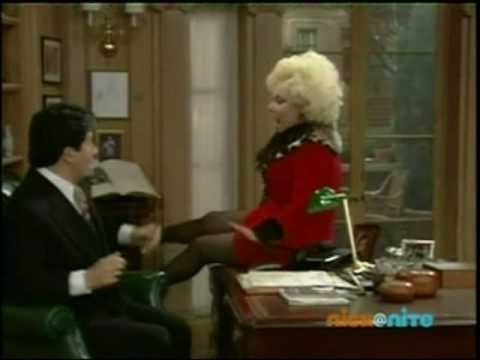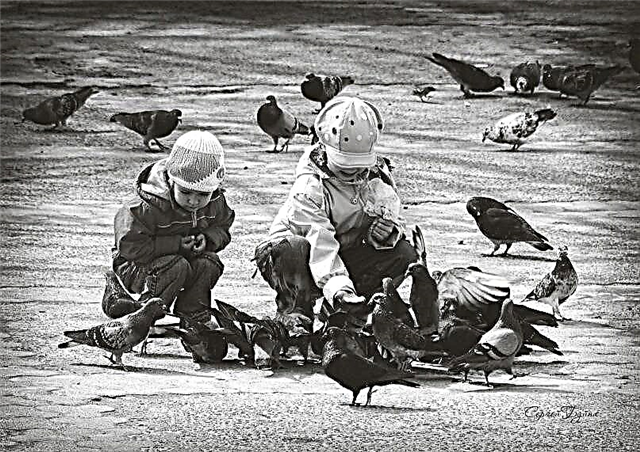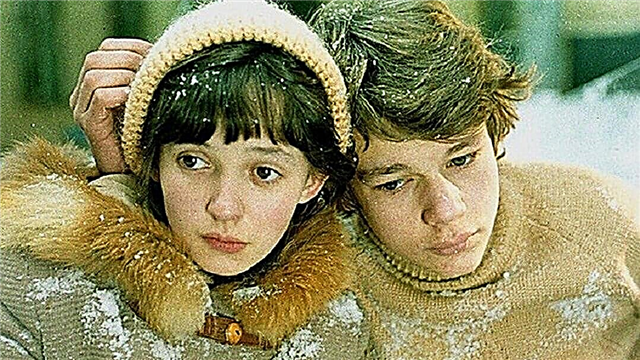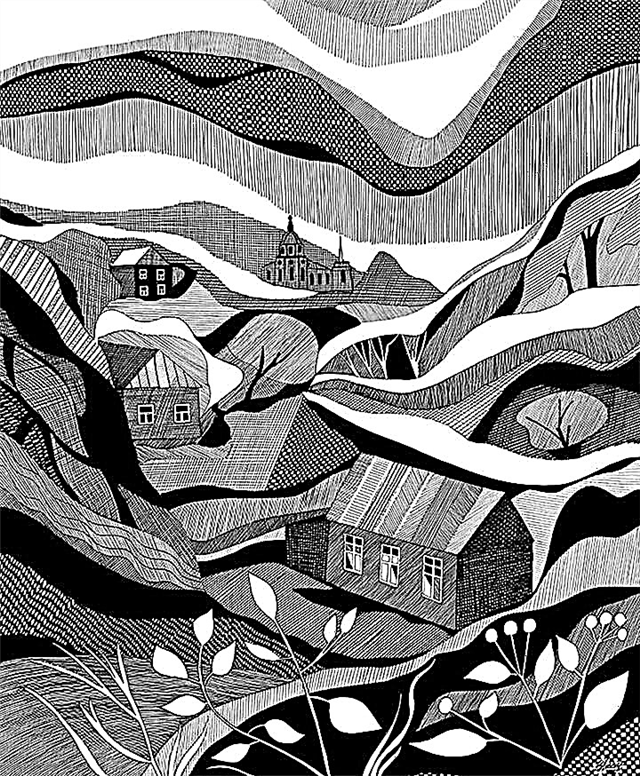The lace-maker Domna Platonovna, known to the storyteller, “has an acquaintance of the most immense and diverse” and is sure that she owes this to one simplicity and “kindness”. People, according to Domna Platonovna, are vile and generally a “bastard,” and no one can be trusted, which is confirmed by the frequent cases when Domna Platonovna is deceived. The lacemaker “across herself is wider” and constantly complains about her health and a mighty dream, from which she suffers a lot of grief and misfortune. Domna Platonovna’s disposition is unhappy, she is indifferent to earnings and, carried away, like her “artist”, with her works, has a lot of private affairs for which lace plays only the role of “pass-through”: wooing, looking for money on mortgages and wearing notes everywhere. At the same time, he retains a delicate appeal and says about the pregnant woman: "she is in her marital interest."
When she met a storyteller living in an apartment with a Polish colonel, whom Domna Platonovna was looking for her fiancé, she noticed that a Russian woman in love was stupid and pathetic. And tells the story of Colonel Domutkovskaya, or Leonidka. Leonidka "stumbled" with her husband, and she got a tenant, "buddy" who does not pay for the apartment. Domna Platonovna promises to find Leonidka such that “there will be love and help,” but Leonidka refuses. The tenant Leonidka quits with a whip, and after a while they have such a "cannon" that the "barbarian" completely disappears. Leonidka is left without furniture, moves to live with the “first fraudster” Disneyshche and, despite the advice of Domna Platonovna, is going to obey her husband. Having not received an answer to the penitential letter, she decides to go to her husband and asks Domna Platonovna for money for the trip. The lacemaker does not give money, confident that a woman should not get out of trouble except through her own fall.
At this time, a friend of the colonel asks Domna Platonovna to introduce him to some "educated" young lady and gives her the money. The “scum” the colonel begins to cry, takes no money and runs away. Two days later he returns and offers his sewing services. Domna Platonovna urges her not to “warp,” but Leonidka does not want to go to her husband for “hateful money” and goes to rich people to ask for help, but ultimately “decides” and promises “not to be capricious”. Domna Platonovna gives her a closet in her apartment, buys clothes and conspires with a familiar general. But when he arrives, the colonel does not unlock the door. Domna Platonovna calls her a "parasite" and a "nobleman's hoop" and so beats that she herself becomes sorry. Leonidka looks crazy, cries, calls on God and mother. Domna Platonovna in a dream sees Leonid Petrovna with a small dog and wants to raise a stick from the ground in order to drive the dog away, but a dead hand appears from under the ground and grabs the lace-maker. The next day, Leonidka meets with the general, after which he changes completely: refuses to talk with Domnaya Platonovna, returns her money for the apartment, categorically refusing to pay “for the chores”. The colonel is no longer going to go to her husband, because “such scum” does not return to her husbands. She rents an apartment and, leaving the lacemaker, adds that she is not angry with Domna Platonovna, because she is "completely stupid." A year later, Domna Platonovna learns that Leonidka is “carrying out romances” not only with the general, but also with his son, and decides to renew her acquaintance. She goes to the colonel, when the general’s daughter-in-law sits at her, Leonidka offers her a "coffee" and sends her to the kitchen, thanks to the fact that the lace-maker made her "rubbish." Domna Platonovna takes offense, scolds and talks about the general’s "daughter-in-law of love" daughter-in-law. A scandal flares up, after which the general abandons the colonel, and she begins to live in such a way that "now one prince, and tomorrow another count."
Domna Platonovna tells the storyteller that in her youth she was a simple woman, but she was so “schooled" that she now cannot believe anyone. Returning home from the acquaintance of the merchant, who treats her with liquor, Domna Platonovna spares money for the cab, walks, and some gentleman wrests a bag from her hands. The narrator assumes that it would be better if she did not skimp and paid the money to the cabman, but the lacemaker is sure that they all have “one strike”, and tells how once she was driven “out of place” because of little money. Once on the ground, she meets an officer who scolds the cabman and protects the lacemaker. But upon returning home, Domna Platonovna discovers that instead of lace in the bundle there are only “trousers thrown off”: as the police explain, this officer came out of the bathhouse and simply robbed the lace-maker. Another time, Domna Platonovna is buying a shirt on the street that has turned into an old washcloth at home. And when Domna Platonovna decides to make a surveyor, his friend says that he is already married. A lacemaker woos a friend, but a land surveyor, a man who “confuses and deprives the entire state,” stipulates the groom with a belly button and upsets the wedding. One day, Domna Platonovna even gives herself an insult to demons: returning from the fair, she turns out to be in the field at night, “dark” faces turn around and a little man the size of a rooster offers her to make love, dance waltzes on the belly of the lace-maker, and disappear in the morning. Domna Platonovna took control of the demon, but failed with the man: she buys furniture for one merchant, sits on top of her on a cart, but falls through and “shines naked” throughout the city until the policeman stops the cart. Domna Platonovna cannot understand in any way whether the sin lies with her for exchanging husbands with a godmother in a dream. After this, and after the story of the captured Turkish Ispulatka, Domna Platonovna “sews up” at night.
A few years later, the narrator takes one poor man to a typhoid hospital and, in the “senior” one, recognizes the very changed Domna Platonovna. After some time, the narrator is summoned to Domna Platonovna, and she asks him to pat about the apprentice piano player Valerochka, who robbed his master. It is not possible to save the thief, Domna Platonovna dies away and prays, and the narrator admits that she loves Valerochka and asks for pity, while everyone laughs at her. A month later, Domna Platonovna dies of rapid exhaustion, and transfers the chest and her "simple belongings" to the narrator so that he gives everything to Valera.


